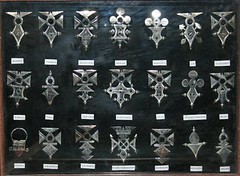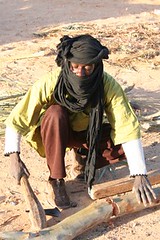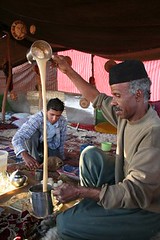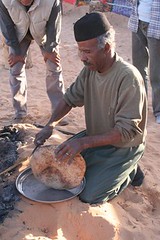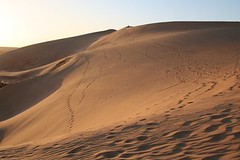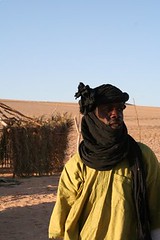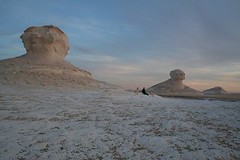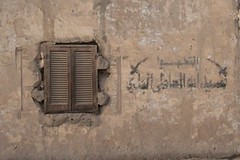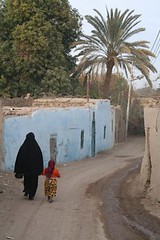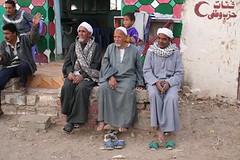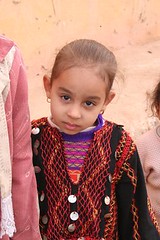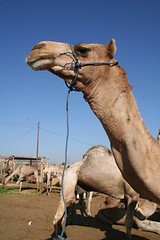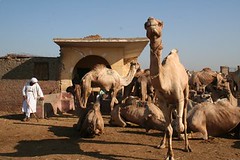The Edge of the Trees
 Sunday, April 9, 2006 at 05:31AM
Sunday, April 9, 2006 at 05:31AM I walked through the streets of Zamalek with a friend to see her new apartment two days ago. We chatted as we went, peered into doorways and shop windows, hopped up and down pavements and stepped over holes, and dodged obstacles. We walked mostly on the road in places where pavements were inaccessible. Later, after a couple of gin and tonics, I walked back alone in the dark. Students around the art school gathered in laughing groups, and with the onset of Spring the girls are wearing brighter colours - orange and green still endure from last season, but there is a lot of fresh clear pinks and blues.
Egyptians are a dear and friendly people, and smiles flash out at me, and occasional greetings as I walk past the groups. Next week is the holiday which translates as something like "Smelling the breeze" where children appear in new clothes, and windows are thrown open to blow away the fug of winter and let in the spring air. It is an old holiday - possibly Pharaonic, and not known in other Arab countries. For me it is a sense of sadness, as it signals the end of what I see as the best weather for walking and exploring, and the onset of a long, fierce and relentless summer.
It occurred to me as I walked that night that this is a dear and familiar place now. This is home in a way that I would not have imagined last year when I really struggled with the sheer difficulty of a daily walk to the shops. I did a lot of work in art school based on a quote from Rhys Jones which I think of as the 'Edge of the Trees'. He talks of the familiarity of home against the mystique of the different - and I won't even try to explain what it means to me as a frequent traveller who lives out of my own culture. I have it on my wall all the time and love it. Just for your information:
Rhys Jones - the Edge of the Trees
"The discoverers" struggling through the surf where met on the beaches by other people looking at them from the edge of the trees. Thus, the same landscape perceived by the newcomers as alien, hostile, having no coherent form, was to the indigenous people their home, a familiar place, the inspiration of their dreams.
The trees here are taking on new leaves. Winter is a short flurry here, not as distinctive as Canberra with its frosts and ice. I have even had basil growing throughout Winter on our marble steps in big tubs. However, trees still lose their leaves and it is nice to see the apparently dead branches starting to put out lacy green frills. Somehow a dormant tree here implies death much more so that at home. Even the new growth is so uncertain - a green fringe will appear on one branch but not another - that I find myself peering out my upstairs windows at the flame trees and jacarandas and thinking "Please, please, be OK!"
In Seoudi supermarket on the corner one man who works mostly inside has always worn a soft flat pair of slippers. In the excitement of Spring his plain brown leather ones have been replaced with a pair in strongly contrasted fake leopard fur, fluffy and bizarre with his neat forest green and beige uniform and cap. Every time I go in they bring me a drink immediately - Coke, or 7-Up, or a juice - which is lovely, but surprisingly awkward if I am juggling a bag, previous shopping from whatever trip I have just been on, and a shopping trolley. Philadelphia cream cheese has disappeared again, and it is a mark of my seige mentality that with the sudden appearance of a shipment of Piccalilli that I bought a bottle 'just in case'- where I don't think I have ever used it in my life!
Chicken has disappeared and we have had deaths here from bird flu. Egypt slammed down fast on the problem and banned all live birds from rooves of apartments and street stalls. Pigeon house are empty, and I miss the great swirls of birds as they took to the skies in the morning. The places that had chickens and geese and turkeys are deserted or locked, and the odd stand of quiet rabbits has replaced birds - and almost needs a sign saying "The other white meat." Most Egyptians will not eat chicken or eggs in fear of bird flu. The worst of the ban is that for many poor Egyptians the stocks of chickens provided their only source of protein, as eggs or meat. Many have been so reluctant to lose their birds that they have removed them from rooves to rooms inside the house - and increased their chances of contracting flu by being even closer to their birds. I am noticing more dead birds in the garden, and lots of small swirling clouds of feathers where a cat has found it first.
In one of the first deaths (gospel according to the press) a woman in hospital claimed to have no contact with birds so her illness was not considerd bird flu. However, as her condition worsened she asked a neighbour to go to her room as her chickens were in a cage under the bed and would need food and water! The neighbour reported her and the disease was identified. She died, and so did her daughter.
I am on the point of leaving for a month. I am a bit reluctant this time. I don't really want to be away from Bob for so long. There was a freedom in having children at home that I had never really appreciated - that when you leave three people behind they have each other for company. I have had enough time in the house on my own this year to be reluctant to do it to Bob. A really big house is somehow much more lonely than a small one. Everything echoes but the rooms are so far apart that a radio playing at one end cannot be heard in another, so you move from silent space to silent space. I have at times put on TV in the study, and a radio in the kitchen, just to fill the silences. Now I do it with an Ipod (what a new toy this has become!) which has its own way of holding the whole world at bay.
I will be in Dunedin over Easter, then Canberra to see family and friends, then working in Coffs Harbour.
I will try to keep up the blog from time to time as I travel.
